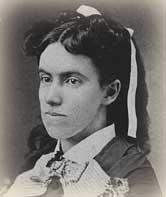
"If I had a thousand lives, I would give them all for the women of China," said Lottie Moon. These words were a testimony to how much Christ had changed her. She wasn't always so dedicated. On the contrary, as a child she was called a "devil" because of her defiant attitude.
Lottie's father was a was well-to-do cotton merchant when she was born in Viewmont, a Virginia plantation in 1840. But he died when she was thirteen. Did bitterness toward God for the loss of her dad drive her into rebellion?
Lottie did not like to go to church. But because of a friend, she agreed to attend a missionary meeting. At that meeting the Holy Spirit showed her how ugly her spirit was. After praying all night, she confessed her bad behavior to God and to others. She decided to become a missionary herself. A good student, Lottie worked hard and graduated with her masters degree. Two years later she sailed as a Southern Baptist missionary to China. Her appeals inspired drives for mission funds in the United States, especially at Christmas. Arriving in China on this day, October 7, 1873, she began work in Tonchow, Northern China.
The Chinese did not respond well to her overtures at first. When she offered them home-baked cookies they refused them, thinking they were poisoned. Gradually, she broke down barriers. She used her knitting and sewing skills to interest Chinese women.
Eleven years after coming to China she prepared for a much needed furlough. As she was about to leave for the United States, men from Pintow arrived on foot, pleading with her to come work in their city where many were eager to hear the gospel. Lottie immediately abandoned her plans for a rest, moved to Pintow, and led many people to know the Jesus who had changed her own life. During her forty years in China, she took only three furloughs.
When she was in her seventies, China suffered severe famine. Lottie would not eat because her people had nothing to eat. Naturally she became ill. She was put on boat to return to America but died of starvation when the ship reached Kobe, Japan. She may not have given a thousand imaginary lives for China but she gave the one she had.
Bibliography:
- Deen, Edith. Great Women of the Christian Faith. New York: Harper, 1956.
- Tucker, Ruth. Guardians of the Great Commission: the story of women in modern missions. Grand Rapids, Michigan: Academie Books, 1988.
- Various internet articles.